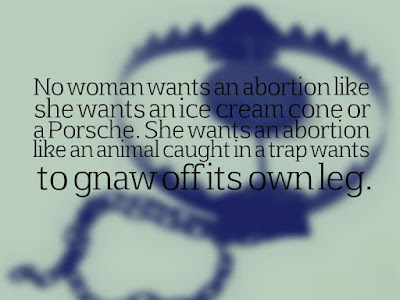Why penalties for illegal abortion should not focus on the woman
…with certain themes emerging. Instead of responding via countless comments in multiple threads, I thought I’d make a blog post.
abortions the tiny human is so tiny, the woman can’t feel any movements. Without the aid of technology she can’t see or hear anything. One major difference between (early term) abortion and infanticide is whether we can even sense the entity we’re harming. This has huge psychological implications.
 |
| I like Supernatural, what can I say? |
But we’ve seen this play out in the context of abortion many times over.
hatred at anyone who harms an infant. Even those without kids generally recognize infants as vulnerable little people in need of our protection and love.
tomorrow, that context would be an important factor and would—and should—influence how we would craft such a law.
our society—then I think it gives more weight to the arguments about including penalties for those seeking abortion.
complicated. It’s complicated by the way child-bearing (and the circumstances surrounding child-bearing) affect a woman’s state of mind. And our legal system (rightly) recognizes state of mind as an important factor when determining guilt and appropriate punishments.
(you knew there was a near certainty your actions would lead to the outcome), or (4) purpose (you knew there was a near certainty your actions would lead to the outcome and that was your goal).
justice system, it can affect culpability.
the repercussions. A high proportion of infanticide cases in the U.S. result in NGRI verdicts (Not Guilty by Reason of Insanity), and it’s unclear how many of these verdicts are based on the actual legal definition of insanity rather than juror conceptions of the term. I won’t repeat the anecdotes from the link here (they are heartbreaking and awful), but it seems judges and jurors are sympathetic to the intense stresses that are often at play when new parents kill their babies.
also think any laws criminalizing abortion should not focus on the woman seeking one. Much of the pro-life movement feels this way (see examples from New Wave Feminists, Abby Johnson, Priests for Life, March for Life, National Right To Life, and Students For Life of America).
that side of the debate as well.
Either way, the women who run Secular Pro-Life recognize that the humanity of the preborn child is not at all clear to many people, and that most women who seek abortion do so under intense pressure. We believe it’s both the most moral position and the best legal approach to make sure penalties for illegal abortions don’t focus on the women seeking them.
If you appreciate our work and would like to help, one of the most effective ways to do so is to become a monthly donor. You can also give a one time donation here or volunteer with us here.




Leave a Reply
Want to join the discussion?Feel free to contribute!